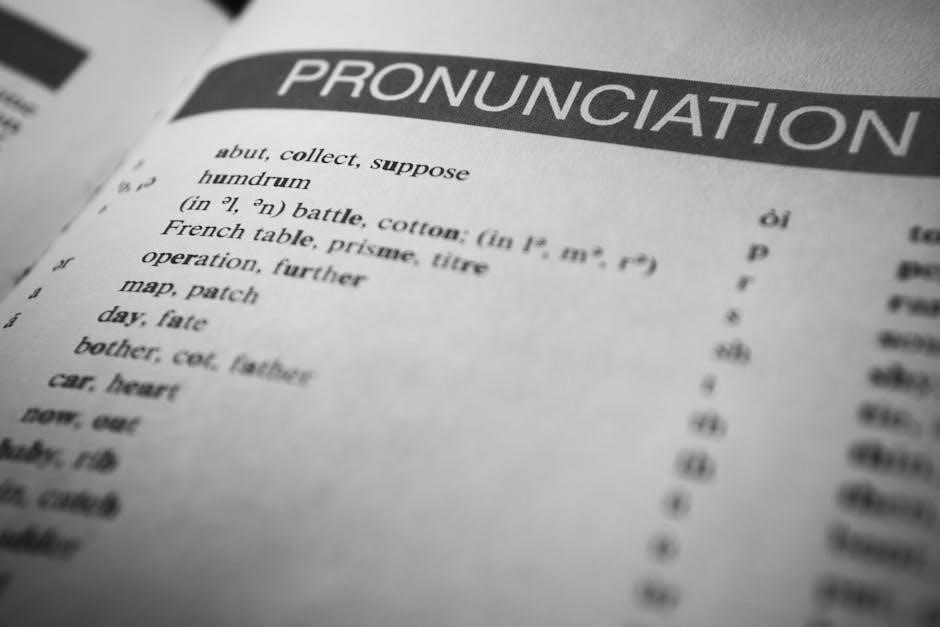Act 3 of Romeo and Juliet is a pivotal turning point, marked by tragic events, emotional turmoil, and escalating conflict. Key moments include Mercutio’s fatal fight with Tybalt, Romeo’s impulsive killing of Tybalt, and his subsequent banishment. Juliet faces her parents’ insistence on marrying Paris, while she and Romeo cling to their love amidst desperation. The act explores themes of love, hate, fate, and family feud, setting the stage for the play’s heartbreaking conclusion.
Act 3 of Romeo and Juliet marks a dramatic escalation of the conflict, shifting the tone from hopeful romance to inevitable tragedy. This act introduces pivotal moments that alter the characters’ fates and intensify the feud between the Montagues and Capulets. The fatal duel between Mercutio and Tybalt sets off a chain of irreversible consequences, including Romeo’s impulsive revenge and his banishment. Juliet, meanwhile, faces her parents’ insistence on marrying Paris, deepening her emotional turmoil. The act explores themes of love, hate, and fate, showcasing the characters’ desperate attempts to navigate their destinies. Through intense emotional struggles and tragic events, Act 3 lays the foundation for the play’s heartbreaking conclusion, highlighting the destructive power of impulsive actions and unrelenting family conflict.

Key Events in Act 3
Mercutio’s fatal duel with Tybalt, Romeo’s impulsive killing of Tybalt, and his subsequent banishment ignite the tragic turn of events. Juliet faces her parents’ demand to marry Paris, escalating her emotional struggle, while the escalating family feud intensifies the conflict.
Mercutio and Tybalt’s Fatal Fight
In Act 3, Mercutio and Tybalt engage in a deadly duel. Benvolio and Mercutio discuss the hot weather when Tybalt arrives, seeking Romeo. Mercutio, eager for a fight, steps in to confront Tybalt. Despite Benvolio’s attempts to mediate, Tybalt provokes Mercutio, leading to a violent clash. Romeo arrives and refuses to fight Tybalt, adhering to the Prince’s decree and his secret marriage to Juliet. Mercutio, angered by Romeo’s hesitation, engages Tybalt and is fatally wounded. As Mercutio dies, he curses both families, declaring, “A plague o’ both your houses!” This tragic event escalates the feud and sets the stage for Romeo’s impulsive vengeance, forever altering the play’s course.
Romeo Kills Tybalt and Faces Banishment
Overcome with grief and rage after Mercutio’s death, Romeo confronts Tybalt and kills him in a fiery duel. This act of vengeance shocks the Prince, who banishes Romeo from Verona. The Prince’s decree intensifies the feud and separates Romeo from Juliet, deepening the tragic conflict. Romeo’s impulsive actions reveal his darker, more violent side, contrasting with his earlier romantic nature. His banishment sets in motion the play’s inevitable tragic course, as Romeo and Juliet are forced apart, unable to escape their fate. This pivotal moment underscores the destructive power of hate and impulsive decisions, forever altering the lives of the star-crossed lovers and their families.
Juliet Learns of Romeo’s Banishment
Juliet, eagerly awaiting Romeo’s return, is devastated when the Nurse delivers the tragic news of Mercutio’s death and Romeo’s banishment. Overwhelmed by grief and shock, Juliet struggles to comprehend the loss of her newfound happiness. She implores the Nurse for details, desperate to understand the circumstances surrounding Romeo’s exile. Juliet’s emotional turmoil deepens as she grapples with the reality of being separated from Romeo and the impossibility of their union. Her love for Romeo intensifies, and she vows to remain loyal, even as her world crumbles. This moment highlights Juliet’s resilience and determination, as well as her growing isolation from her family and society. The news sets Juliet on a path of defiance and desperation, ultimately leading her to seek drastic solutions to reunite with Romeo.
Juliet’s Parents Arrange Her Marriage to Paris
Juliets parents, Lord and Lady Capulet, arrange her marriage to Paris, believing it to be a advantageous match. They expect Juliet to obey, unaware of her secret marriage to Romeo. Juliet refuses, declaring her love for Romeo and her inability to marry another. Her defiance shocks her parents, who view her disobedience as unacceptable. Lord Capulet threatens to disown Juliet if she does not comply, while Lady Capulet insists on her duty to the family. Juliet’s refusal intensifies the conflict, deepening her emotional turmoil. The arranged marriage accelerates the plays tragic momentum, forcing Juliet to seek desperate measures to avoid the union and remain true to Romeo. This confrontation highlights the clash between familial expectations and personal desire, driving Juliet toward a risky solution to protect her love.

Character Analysis in Act 3
Romeo’s transformation from lover to avenger, Juliet’s defiance, Tybalt’s hatred, Mercutio’s tragic loss, and Friar Laurence’s risky plan highlight the emotional depth and complexity of characters.
Romeo’s Transformation: Love, Grief, and Rage

Romeo’s character undergoes a profound transformation in Act 3, driven by love, grief, and rage. Initially, Romeo is portrayed as a romantic and peaceful figure, deeply devoted to Juliet. However, the tragic death of his friend Mercutio at the hands of Tybalt unleashes a darker, more impulsive side of his personality. Overcome with anger and a desire for vengeance, Romeo kills Tybalt, an act that starkly contrasts with his earlier gentle nature. This impulsive decision leads to his banishment from Verona, plunging him into despair. Despite his vulnerability, Romeo’s love for Juliet remains unwavering, intensifying his emotional turmoil. His actions in Act 3 reveal a complex character, driven by both passion and rage, ultimately setting the stage for the tragic events that follow. This transformation highlights the destructive power of unchecked emotions and the devastating consequences of impulsive decisions.
Juliet’s Defiance and Emotional Turmoil
In Act 3, Juliet exhibits remarkable defiance and emotional depth as she navigates the chaos of her world. Learning of Romeo’s banishment and her parents’ insistence on marrying Paris, Juliet’s hope turns to despair. She refuses to obey her parents, declaring her love for Romeo and defying their authority, showcasing her growing independence. Her emotional turmoil intensifies as she grapples with the impossibility of her situation, even considering death as a preferable alternative to life without Romeo. Desperate for a solution, Juliet turns to Friar Laurence, demonstrating her courage and determination. Her actions highlight her resilience and devotion to love, despite the overwhelming odds against her. This defiance marks Juliet’s evolution from a obedient daughter to a strong-willed individual willing to risk everything for her heart, underscoring her tragic heroine role in the play.
Tybalt: A Symbol of Hatred and Revenge
Tybalt embodies the destructive forces of hatred and revenge in Act 3, driving the tragic events forward. His deep-seated animosity toward the Montagues fuels his aggressive behavior, as seen in his relentless pursuit of Romeo. Tybalt’s confrontation with Mercutio highlights his impulsive nature and arrogance, leading to the fatal duel. His refusal to back down, even when Romeo hesitates, underscores his pride and loyalty to his family’s name. Tybalt’s death at Romeo’s hands escalates the feud, intensifying the cycle of vengeance. His character serves as a catalyst for the play’s tragic outcome, illustrating the devastating consequences of unchecked hatred and the blind pursuit of honor. Through Tybalt, Shakespeare underscores the destructive power of revenge, making him a pivotal figure in the play’s descent into tragedy.
Mercutio: The Tragic Loss of a Loyal Friend
Mercutio’s death in Act 3 marks a devastating turning point, highlighting his loyalty and the senseless violence of the feud. Known for his wit and fiery spirit, Mercutio steps in to fight Tybalt when Romeo refuses, showcasing his unwavering friendship. His fatal stabbing at Tybalt’s hand sparks Romeo’s rage, leading to Tybalt’s death and Romeo’s banishment. Mercutio’s final curse, “A plague o’ both your houses,” underscores the destructive nature of the families’ hatred. His loss profoundly affects Romeo, driving his impulsive actions and emotional turmoil. Mercutio’s tragic demise symbolizes the innocent victims of the feud, emphasizing the pointless tragedy of their conflict. His character serves as a reminder of the devastating consequences of unchecked rivalry and impulsive behavior, making his death a pivotal moment in the play’s tragic progression.
Friar Laurence: The Mentor’s Risky Plan
Friar Laurence plays a crucial role in Act 3, devising a risky plan to reunite Romeo and Juliet. Upon learning of Romeo’s banishment, the Friar consoles him and proposes a daring solution. He gives Juliet a potion to make her appear dead, hoping to avoid her marriage to Paris. This plan, though well-intentioned, carries significant risks and relies on precise timing. The Friar’s strategy highlights his belief in the power of love and his willingness to challenge fate. However, the complexity of the plan and the potential for miscommunication foreshadow the tragic outcome. Despite his wisdom, the Friar’s interference underscores the dangerous consequences of manipulating destiny, adding depth to the play’s exploration of fate and human intervention. His actions, though noble, ultimately contribute to the escalating tragedy, revealing the fragility of hope in the face of overwhelming adversity.

Scene-by-Scene Breakdown
Act 3 unfolds through five pivotal scenes, each escalating tension and tragedy. The duel, Juliet’s wait, Romeo’s banishment, her confrontation with parents, and their farewell intertwine love, fate, and conflict.
Scene 1: The Duel and Its Aftermath
Scene 1 opens with Mercutio and Benvolio discussing the heat and potential confrontations with the Capulets. Tybalt arrives, seeking Romeo, and Mercutio eagerly steps in to fight. Despite Benvolio’s attempts to mediate, Tybalt provokes Mercutio, leading to a duel. Romeo arrives and refuses to fight, but Mercutio, angered by Romeo’s hesitation, engages Tybalt and is fatally wounded. As Mercutio dies, he curses both families, declaring, “A plague o’ both your houses!” Overcome with rage and grief, Romeo kills Tybalt. The scene ends with the Prince banishing Romeo from Verona, leaving Juliet alone and heartbroken. This pivotal moment escalates the feud and sets the tragic course of events in motion, highlighting the destructive consequences of hatred and impulsive actions.

Scene 2: Juliet’s Impatient Wait
In Scene 2, Juliet eagerly awaits Romeo, displaying her deep longing for their union. She sends the Nurse to fetch Romeo, emphasizing her impatience and desire for their night together. When the Nurse returns with Romeo’s message, Juliet’s excitement turns to concern as she learns Romeo must leave soon. Juliet expresses her fear that their love may not endure, revealing her growing anxiety about their future. The Nurse advises Juliet to remain patient and trust in Romeo’s love, but Juliet’s emotions fluctuate rapidly, reflecting her youthful passion and vulnerability. This scene highlights Juliet’s emotional depth and her struggle to balance love with the harsh realities of her world, foreshadowing the tragic events to come.
Scene 3: Romeo’s Banishment and Friar’s Plan
In Scene 3, Romeo visits Friar Laurence, who informs him of his banishment from Verona as punishment for killing Tybalt. Romeo is devastated, expressing a preference for death over separation from Juliet. The Friar, attempting to console him, reveals a plan for Romeo to secretly spend the night with Juliet and then escape to Mantua. Romeo, though initially despairing, finds hope in the Friar’s words and agrees to the plan. This scene highlights Romeo’s emotional instability and reliance on the Friar for guidance. It also underscores the growing tension between Romeo’s passion for Juliet and the consequences of his actions, setting the stage for the tragic events that follow.
Scene 4: Juliet’s Confrontation with Her Parents
In Scene 4, Juliet faces intense pressure from her parents, Lord and Lady Capulet, who demand she marry Paris. Juliet refuses, declaring her heart belongs to Romeo, a defiance that shocks her parents. Lord Capulet, enraged by her disobedience, threatens to disown her if she does not comply. Lady Capulet, equally displeased, reminds Juliet of her duty to obey. This confrontation highlights Juliet’s growing independence and her willingness to risk everything for love. Her parents’ insistence accelerates the conflict, pushing Juliet toward desperate measures. The emotional tension escalates as she realizes the impossibility of pleasing both her family and her heart, marking a pivotal moment in her journey.
Scene 5: Romeo and Juliet’s Heartbreaking Farewell
In Scene 5, Romeo and Juliet share a poignant farewell after their secret marriage. The lovers cling to each other, reluctant to part, as the reality of Romeo’s banishment looms. Juliet’s nurse interrupts, urging Romeo to leave before discovery. Juliet, fearing for Romeo’s safety, begs him to stay, but Romeo knows he must depart. Their dialogue is filled with affection and longing, yet overshadowed by the reality of their separation. Juliet expresses her desire to remain with Romeo forever, while Romeo reassures her of their enduring love. This intimate moment captures the depth of their emotional bond, even as fate begins to tear them apart. Their farewell underscores the tragic circumstances of their families’ feud and the inevitable consequences of their love.

Themes in Act 3

Central themes include love vs. hate, as Romeo and Juliet’s bond contrasts with the escalating feud. Fate and impulsiveness drive tragic events, while family conflict deepens the destructive cycle.
Love vs. Hate: The Central Conflict
In Act 3, the struggle between love and hate intensifies, shaping the tragic events. Romeo and Juliet’s profound love contrasts sharply with the deep-seated hatred between their families. This conflict is evident in key scenes, such as Mercutio’s death and Romeo’s subsequent killing of Tybalt, which underscores the destructive power of hate. Meanwhile, Juliet’s defiance of her parents to be with Romeo highlights the enduring strength of love. The tension between these opposing forces drives the play’s narrative, ultimately leading to devastating consequences. This central conflict not only fuels the characters’ actions but also underscores the inevitability of the tragic outcome, as love and hate collide in a fatal dance.
Fate and Tragedy: The Unavoidable Destiny
Act 3 underscores the theme of fate and tragedy, as the characters’ paths become irreversibly intertwined with destiny. The tragic sequence of events, including Mercutio’s death, Romeo’s banishment, and Juliet’s forced engagement, highlights the inevitability of their doomed fate. Romeo’s impulsive actions and Juliet’s desperate decisions accelerate the tragic momentum, driven by circumstances beyond their control. The feud between their families and the societal norms amplify the sense of inescapable destiny. The lovers’ attempts to defy fate, such as Juliet’s plea to Friar Laurence, ultimately lead to heartbreak. Shakespeare uses foreshadowing and dramatic irony to emphasize the unavoidable tragedy, leaving the audience aware of the impending doom. This act serves as a turning point, solidifying the play’s tragic trajectory and the fateful end of the star-crossed lovers.
Family Feud and Its Destructive Power
The family feud between the Montagues and Capulets reaches a boiling point in Act 3, driving the tragic events that unfold. The hatred between the families fuels violent confrontations, such as the deadly duel between Mercutio and Tybalt, which ultimately leads to Romeo’s banishment. The feud escalates tensions, causing irreversible consequences for the lovers. Juliet’s parents, insisting she marry Paris, deepen her despair, while Romeo’s actions are motivated by loyalty to his friend and rage against the Capulets. The destructive power of the feud is evident in the loss of life, emotional turmoil, and fractured relationships. Shakespeare highlights how blind hatred prevents reconciliation, dooming the families to endless suffering and the lovers to their tragic fate. The feud’s relentless cycle of revenge and retaliation underscores its devastating impact on Verona.
Impulsiveness and Its Consequences
Impulsiveness drives the tragic events of Act 3, as rash decisions lead to devastating consequences. Romeo’s impulsive killing of Tybalt, driven by grief and rage over Mercutio’s death, results in his banishment from Verona. This act of vengeance not only escalates the family feud but also separates Romeo from Juliet, intensifying their emotional turmoil. Juliet, too, acts impulsively when she decides to fake her death to avoid marrying Paris, a desperate move that sets off a chain of irreversible events. The impulsive nature of the characters highlights how their emotional reactions override reason, leading to a spiral of tragedy. These hasty decisions underscore the destructive power of acting without forethought, ultimately contributing to the play’s heartbreaking conclusion. Shakespeare uses this theme to emphasize how impulsiveness can have far-reaching and disastrous effects.

Symbols and Motifs in Act 3
Act 3 introduces key symbols like the sword, representing violence and conflict, and the potion, symbolizing hope and deception. Night and day contrast love and despair, emphasizing the struggle between light and dark forces driving the tragedy.
The Sword: A Symbol of Violence and Conflict
The sword in Act 3 of Romeo and Juliet symbolizes the pervasive violence and deep-seated hatred between the Montagues and Capulets. It is central to the tragic events, as Mercutio’s fatal duel with Tybalt and Romeo’s subsequent killing of Tybalt escalate the conflict. The sword represents the destructive power of revenge and impulsive actions, transforming Romeo from a lover to a killer. Its presence underscores the cyclical nature of violence, as the feud between the families intensifies. The sword also serves as a catalyst for Romeo’s banishment, highlighting how violence disrupts love and peace. Through the sword, Shakespeare illustrates how hatred and aggression can lead to devastating consequences, ultimately contributing to the play’s tragic outcome.
The Potion: Hope and Deception
The potion in Act 3 symbolizes both hope and deception, representing Juliet’s desperate attempt to escape her arranged marriage to Paris. Friar Laurence devises the plan, offering Juliet a potion that will make her appear dead, hoping it will buy time for Romeo to return and resolve the conflict. The potion embodies hope as it promises a temporary solution to Juliet’s plight, allowing her to avoid the marriage and reunite with Romeo. However, it also represents deception, as Juliet must trick her family and society into believing she is dead. This risky plan highlights Juliet’s courage and determination but also sets the stage for tragic misunderstandings. The potion serves as a turning point, illustrating Juliet’s willingness to take drastic measures for love, while foreshadowing the devastating consequences of her actions. It underscores the theme of love’s power and the dangers of desperation.
Night and Day: The Struggle Between Light and Dark
In Act 3, Shakespeare uses the contrast between night and day to symbolize the struggle between light and dark, hope and despair. Night represents secrecy, passion, and escape, as seen in Romeo and Juliet’s stolen moments together. Day, however, symbolizes openness, conflict, and reality, as evident in the public feuds and tragic events. The duel between Mercutio and Tybalt occurs in daylight, emphasizing the brutality and inevitability of their fate. Conversely, Romeo and Juliet’s farewell takes place at night, highlighting their fleeting happiness and the illusion of control over their destiny. This contrast underscores the themes of love versus hate and the fragility of peace amidst conflict. The interplay of light and dark reflects the characters’ emotional journeys and the tragic trajectory of the play.

Literary Devices in Act 3
Shakespeare employs foreshadowing, imagery, and dramatic irony to heighten tension and emotional depth. These devices emphasize the inevitable tragedy, amplifying the play’s dramatic impact and thematic resonance.
Foreshadowing: Signs of the Tragic End
Foreshadowing in Act 3 underscores the inevitable tragic conclusion. Mercutio’s death and his curse, “A plague o’ both your houses,” hint at the destruction awaiting the Montagues and Capulets. Romeo’s banishment and Juliet’s arranged marriage to Paris create a sense of impending doom. Juliet’s fear of losing Romeo and her parents’ insistence on the marriage foreshadow her desperate actions. The Friar’s risky plan with the potion suggests potential failure, while Romeo’s emotional instability and impulsive decisions preview the devastating finale. These elements collectively build tension, signaling the heartbreaking end for the star-crossed lovers and the fateful resolution of the family feud.
Irony: The Prince’s Decree and Its Impact
The Prince’s decree to reduce violence in Verona ironically backfires in Act 3. His attempt to maintain peace leads to increased tension when Mercutio and Tybalt clash, defying his orders. The Prince’s punishment for Tybalt’s death—banishing Romeo—intensifies the conflict rather than resolving it. This unintended consequence highlights the futility of authority in controlling the deep-rooted feud between the Montagues and Capulets. The irony lies in how the Prince’s efforts to enforce order ultimately escalate the tragedy, setting the stage for the heartbreaking events that follow. His decree serves as a catalyst for the play’s tragic progression, underscoring the inevitability of fate and the destructive power of hatred.
Imagery: Describing Emotions and Settings
Shakespeare uses vivid imagery in Act 3 to convey intense emotions and set the tone for tragic events. The duel scene is filled with imagery of conflict and violence, such as “blood” and “clashing swords,” emphasizing the escalating feud. Juliet’s chamber is portrayed as a space of both love and despair, with imagery of light and darkness symbolizing her inner turmoil. Romeo’s emotional state is mirrored in descriptions of night and shadows, reflecting his grief and isolation. The Prince’s courtroom and the streets of Verona are depicted as places of tension and authority, underscoring the societal pressures. Through these images, Shakespeare creates a rich emotional landscape, drawing the audience into the characters’ struggles and the tragic world they inhabit. The imagery enhances the play’s dramatic intensity and thematic depth.
Act 3 of Romeo and Juliet is a turning point, marked by tragic events that escalate the conflict. The loss of Mercutio, Romeo’s banishment, and Juliet’s defiance set the stage for the inevitable tragic conclusion, highlighting the destructive power of hate and the enduring strength of love.
Act 3: A Turning Point in the Tragedy
Act 3 marks a dramatic shift in the play, intensifying the conflict and setting the stage for the inevitable tragic conclusion. The deaths of Mercutio and Tybalt, Romeo’s banishment, and Juliet’s desperate defiance of her parents heighten the emotional stakes. This act underscores the destructive power of hatred and the inevitability of fate, as the characters’ actions spiral out of control. Romeo’s transformation from a lovesick romantic to a vengeful killer and Juliet’s bold resistance to her family exemplify the irreversible consequences of their choices. The escalating family feud and the lovers’ desperate attempts to preserve their love create a sense of hopelessness, foreshadowing the devastating events to come. Act 3 is thus a pivotal moment, propelling the story toward its heartbreaking resolution.





